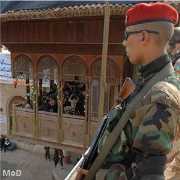Now that It Doesn’t Have to Impress the EU, Turkey Could Curtail Women’s Rights
 Turkey, formerly eager for an invite into the European Union clubhouse, has drifted away from the continent it has played historical boogeyman to in the wake of the Arab Spring, and gravitated towards the more conservative values of an Arab world it sees an opportunity to dominate. As a result, according to the New York Times’ Dan Bilefsky, human rights groups worry that renewed conservative vigor in Turkey is starting to erode women’s rights.
Turkey, formerly eager for an invite into the European Union clubhouse, has drifted away from the continent it has played historical boogeyman to in the wake of the Arab Spring, and gravitated towards the more conservative values of an Arab world it sees an opportunity to dominate. As a result, according to the New York Times’ Dan Bilefsky, human rights groups worry that renewed conservative vigor in Turkey is starting to erode women’s rights.
Though experts say that accurate statistics are hard to come by in Turkey because of a serious underreporting of domestic violence, human rights groups have pointed to a recent rash of high-profile attacks on women as evidence that Turkey’s progress on women’s rights is being nibbled away by the zeitgeist of social conservatism prevailing Middle East right now. Violence against women has intensified so dramatically — spiking from 66 reported cases in 2002 to 953 in 2009 — that at least one outreach group is suggesting that Turkish women skip political protests and simply arm themselves with handguns, because nothing says “stop the violence” like a good-old-fashioned gunfight.
A culture war has ignited in recent years over the role women play in Turkish society. The country, though predominantly Muslim, boasts an official state secularism. Defenders of that secularism have clashed with an increasingly emboldened and ascendant class of religious conservatives, whose rise has led to more men “acting with impunity against women.” Last year alone saw 207,253 cases of deliberate injuries to women across the country, compared with 189,377 in 2010, according to the National Police Headquarters in Ankara. A UN report also shows that incidents of domestic violence in Turkey (39 percent of 12,785 women interviewed across the country reported some type of abuse throughout their lives) topped those percentages of violence among U.S. women (22 percent) and European women (between 3 and 35 percent in different countries).
Suspicion that women were going to have a hard time under the current governing party increased when President Abdullah Gul approved a controversial bill this month that extended compulsory education to 12 years, but allowed homeschooling after the first eight. Critics have said that such a homeschooling provision could encourage men to take child brides, though the government has brushed off such concerns, emphasizing the fact that the law brings Turkey in line with with international education standards.
The rise in murders of women to 953 in the first seven months of 2009 predictably surprised the Turkish public, but experts believe that, in a country of about 80 million people, the figure is still low and perhaps skewed by underreporting of such violence. When the governing Justice and Development Party of Prime Minister Recep Tayyip Erdogan came to power in 2002, he made a national push for Turkish membership in the European Union, emphasizing, as part of that campaign, women’s rights. Laws that inhibited women from participating as full-fledged citizens were largely removed and others prohibiting rape within marriage as well as criminalizing so-called “honor killings” were added. Now, observers such as Nigar Goksel at the European Stability Initiative, believe that Turkey is being tugged in a conservative direction by the Arab world, explaining that while the Turkish government started out as friendly towards women, “The Arab Spring is pulling Turkey in a more conservative direction.”
Others in Turkey contend that new legislation has only improved the lot of Turkish women and that claims that the government is backsliding into sexism or even outright oppression are overblown. Still, Turkey is historically a very patriarchal country, and it might take more than well-meaning legislation to reverse some of the more pervasive and pernicious attitudes about women. As proof of this continuing struggle, Bilefsky notes that, while every municipality with 50,000 people is required by law to have at least one women’s shelter, currently a mere 79 shelters exist across the entire country. That number, according to human rights experts, falls well short of the legal requirement, leaving women who do suffer domestic abuse without a safe haven to turn to.
Women See Worrisome Shift in Turkey [NY Times]
via Now that It Doesn’t Have to Impress the EU, Turkey Could Curtail Women’s Rights.


